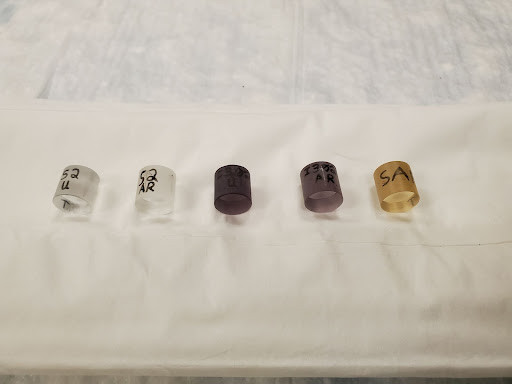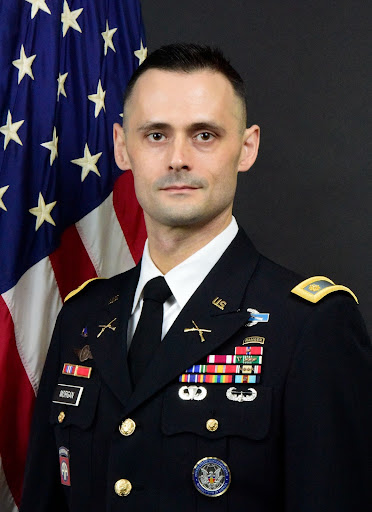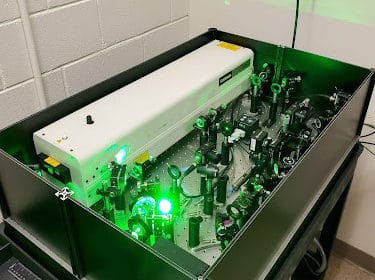
Ionizing radiation induces a negative nonlinear absorption coefficient in quartz glass
NERS PhD Student Bryan Morgan’s research on non-linear absorption in quartz glass published in Optical Materials Express.

NERS PhD Student Bryan Morgan’s research on non-linear absorption in quartz glass published in Optical Materials Express.

Bryan Morgan, a Ph.D. student at the U-M Department of Nuclear Engineering and Radiological Sciences (NERS) advised by Professor Igor Jovanovic, observed for the first time that certain glasses, after being exposed to ionizing radiation, become more transparent when exposed to strong laser light.
“For many common optical materials, such as quartz glass and sapphire, their linear and nonlinear optical properties are well-studied so that their performance is predictable. However, when exposed to ionizing radiation, such as in fission or fusion reactor environments or in outer space, the materials’ optical properties can be altered. The radiation-induced changes to the linear properties of optical materials have been well studied, but the radiation changes of the nonlinear optical properties have not yet been addressed,” Bryan said, “To study how radiation alters nonlinear properties, we developed a mobile Z-scan setup at the NERS department, which can directly measure the nonlinear absorption and refraction. The Z-scan focuses a laser to high intensity inside an optical material and measures the transmitted laser power as the sample is translated through the laser focus. This provides insight into the intensity-dependent nonlinear optical properties. We subsequently moved the Z-scan setup to the Ohio State University Nuclear Reactor Laboratory, where we irradiated and examined optical samples.”
“This research gave us an unexpected result – ionizing radiation induces a negative nonlinear absorption coefficient in quartz glass. This means that, as the laser intensity in the irradiated material is increased, the fraction of light absorbed in the material decreases,” Bryan added, “The negative nonlinear absorption counteracts some of the induced absorption by transmitting a greater fraction of incident light as the intensity is increased. This is important because it demonstrates that radiation damage of bulk optical materials has less effect on the passage of high-intensity light through certain optical materials than previously thought.”
Bryan’s paper on this research, titled, “Gamma-radiation-induced negative nonlinear absorption in quartz glass” was recently published in Optical Materials Express. On having his research published, Brian said, “I am very happy to publish and share this work so that the findings of basic research can be used in appropriate industry and scientific applications. Perhaps it has opened a new and interesting area for further research into radiation-altered nonlinear optics.”

The problem, according to Bryan, that this research is trying to solve, is to provide insight into the effects of ionizing radiation on the nonlinear optical properties of bulk optical materials, specifically the nonlinear absorption and nonlinear index of refraction for glasses and sapphire. He said, “This situation is similar to trying to watch a movie while wearing glasses and worrying about ruining the movie quality when your glasses become dirty or foggy. If your glasses have a negative ‘dirty glasses’ coefficient, then no matter how dirty they become, you can still watch the movie clearly if the movie projector is tuned to a high enough brightness, and you’re no longer worried about cleaning your glasses in the middle of a movie.” and that “This research is relevant to any laser application in continuous and intense radiation environments. These findings can assist material selection for the application of laser optics in fission reactor sensors, inertial confinement fusion research that relies upon lasers for ignition, and space-based laser applications.”

Bryan, who completed the Army Reserve Officer Training Corps program at Washington State University, was commissioned as an Army officer when he completed his undergraduate studies in Astrophysics (2004) and has served in the Army since graduating in 2004. The Army funded his graduate education in nuclear engineering at the master’s level at Pennsylvania State University (2015) and Ph.D. level (U-M) under Professor Jovanovic. “I’ve enjoyed my time in NERS regardless of COVID challenges. I think Professor Allen is an extremely professional department chair and sets a great climate across the department. Professor Jovanovic is an ideal advisor because he pushes his students to become competent and responsible engineers ready for challenges beyond graduation,” Bryan continued, “Dr. Milos Burger spent countless hours in the lab providing technical assistance and advice to help make this project successful. The staff at NERS are extremely helpful and have supported me throughout my time at NERS, particularly Garnett Roberts, Rob Blackburn, and Jennifer Melms, and everyone in the department that makes things happen every day.” After completing PhD. from NERS, Bryan will continue to serve as a Nuclear and Countering Weapons of Mass Destruction officer in the US Army.
The project has been supported by the Department of Energy under the Nuclear Science User Facility (NSUF) program, and some irradiations have also been supported by the Defense Threat Reduction Agency within the Interaction of Ionizing Radiation with Matter – University Research Alliance (IIRM-URA).